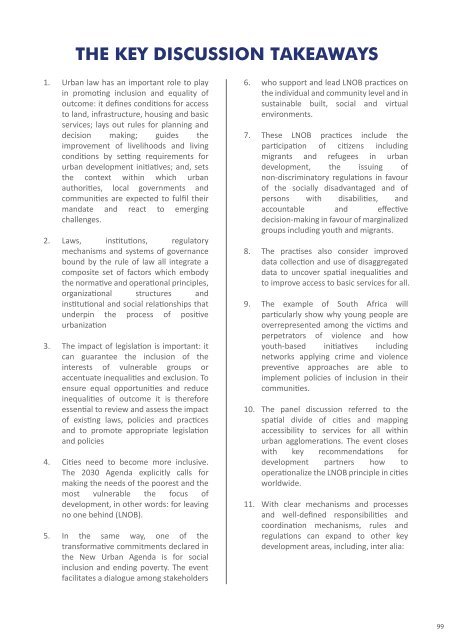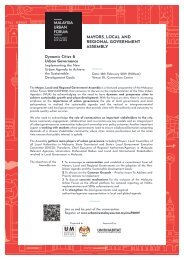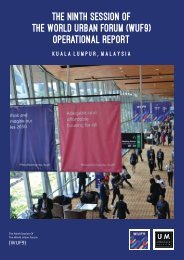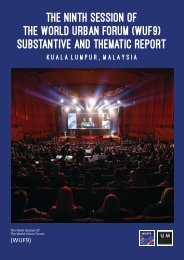WUF9 Substantive Report-s
You also want an ePaper? Increase the reach of your titles
YUMPU automatically turns print PDFs into web optimized ePapers that Google loves.
THE KEY DISCUSSION TAKEAWAYS<br />
1.<br />
2.<br />
3.<br />
4.<br />
5.<br />
Urban law has an important role to play<br />
in promong inclusion and equality of<br />
outcome: it defines condions for access<br />
to land, infrastructure, housing and basic<br />
services; lays out rules for planning and<br />
decision making; guides the<br />
improvement of livelihoods and living<br />
condions by seng requirements for<br />
urban development iniaves; and, sets<br />
the context within which urban<br />
authories, local governments and<br />
communies are expected to fulfil their<br />
mandate and react to emerging<br />
challenges.<br />
Laws, instuons, regulatory<br />
mechanisms and systems of governance<br />
bound by the rule of law all integrate a<br />
composite set of factors which embody<br />
the normave and operaonal principles,<br />
organizaonal structures and<br />
instuonal and social relaonships that<br />
underpin the process of posive<br />
urbanizaon<br />
The impact of legislaon is important: it<br />
can guarantee the inclusion of the<br />
interests of vulnerable groups or<br />
accentuate inequalies and exclusion. To<br />
ensure equal opportunies and reduce<br />
inequalies of outcome it is therefore<br />
essenal to review and assess the impact<br />
of exisng laws, policies and pracces<br />
and to promote appropriate legislaon<br />
and policies<br />
Cies need to become more inclusive.<br />
The 2030 Agenda explicitly calls for<br />
making the needs of the poorest and the<br />
most vulnerable the focus of<br />
development, in other words: for leaving<br />
no one behind (LNOB).<br />
In the same way, one of the<br />
transformave commitments declared in<br />
the New Urban Agenda is for social<br />
inclusion and ending poverty. The event<br />
facilitates a dialogue among stakeholders<br />
6.<br />
7.<br />
8.<br />
9.<br />
10.<br />
11.<br />
who support and lead LNOB pracces on<br />
the individual and community level and in<br />
sustainable built, social and virtual<br />
environments.<br />
These LNOB pracces include the<br />
parcipaon of cizens including<br />
migrants and refugees in urban<br />
development, the issuing of<br />
non-discriminatory regulaons in favour<br />
of the socially disadvantaged and of<br />
persons with disabilies, and<br />
accountable and effecve<br />
decision-making in favour of marginalized<br />
groups including youth and migrants.<br />
The pracses also consider improved<br />
data collecon and use of disaggregated<br />
data to uncover spaal inequalies and<br />
to improve access to basic services for all.<br />
The example of South Africa will<br />
parcularly show why young people are<br />
overrepresented among the vicms and<br />
perpetrators of violence and how<br />
youth-based iniaves including<br />
networks applying crime and violence<br />
prevenve approaches are able to<br />
implement policies of inclusion in their<br />
communies.<br />
The panel discussion referred to the<br />
spaal divide of cies and mapping<br />
accessibility to services for all within<br />
urban agglomeraons. The event closes<br />
with key recommendaons for<br />
development partners how to<br />
operaonalize the LNOB principle in cies<br />
worldwide.<br />
With clear mechanisms and processes<br />
and well-defined responsibilies and<br />
coordinaon mechanisms, rules and<br />
regulaons can expand to other key<br />
development areas, including, inter alia:<br />
99






